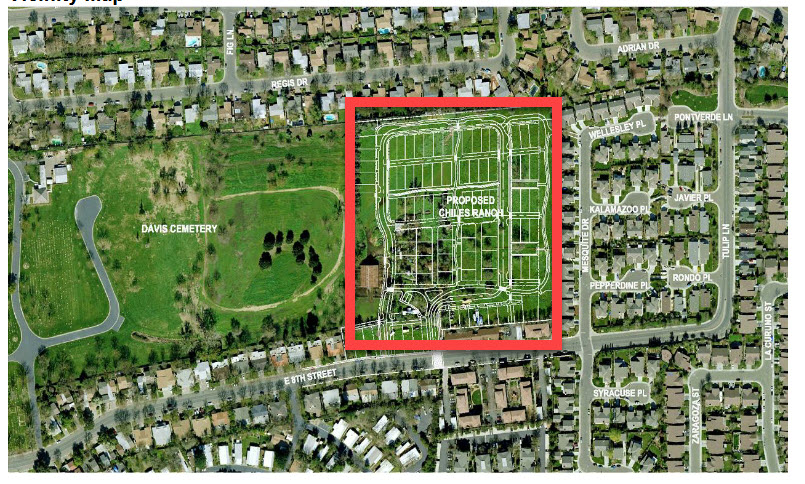 By David M. Greenwald
By David M. Greenwald
Executive Editor
Davis, CA – Last week the Chiles Ranch development agreement extension went to the Planning Commission—it will go to Council on May 7.
The Council must act by July 6 on whether to grant another extension to the project in order to complete the final map process and begin construction.
I have mixed feelings on this—as did the Planning Commission which expressed hesitation when it came to extending the Development Agreement due to the length of time since the initial approval.
Is there any guarantee that this housing development will get built?
My concern is this: the original project was approved back in June 2009. It was a contentious process at that time—and was approved on a 3-2 vote.
On the one hand, Davis clearly needs housing built as soon as possible. And while this is not a huge project, it would create just under 100 new single-family homes—and as we have been pointing out when you’ve only built just over 700 such homes in the last 16 years, nearly 100 is not an insignificant number.
At the same time, this is one of the few sizable enough spaces to build housing. Had this project been approved today, there is no way it would have been approved as such a  low-density project, given the extent of our needs.
low-density project, given the extent of our needs.
On the other hand, it was made clear by the applicants that a new national developer is willing to build the project, but the suggestion last week was that any attempt to re-open the development agreement would cause—or at least potentially cause—that developer to walk.
This is precisely the problem that we are in.
On the one hand, while I am not suggesting nefarious intent, the fact remains that by sitting on entitlements for 15 years, the property owner has greatly increased the value of the property and the eventual houses.
That’s a clear win by the owner simply for sitting on the entitlements and getting them approved.
Second, the world has changed dramatically since 2009. As mentioned, there is no way that the council would have approved such a low-density project on vacant land within the city in 2024.
But third, Davis needs housing and that limits what the city can do. There were several points made that “incentives and conditions” designed to force construction of the project would likely scare the developer away.
“Any housing we can get at this point is good housing,” remarked Planning Commission Chair Greg Rowe.
Maybe. Certainly some housing on that spot is better than no housing. But this whole episode makes one wonder what Davis needs to be able to do to get vital housing approved and then actually built.
Some projects have been able to get approved relatively easily and then built. Others are still languishing in between approval and development.
The problem here is particularly glaring because Davis has such few infill spots at this point.
The council has a few weeks to perhaps approach the applicant and see if there are any potential modifications to the project that could be a win for both the city and the applicant. There may not be.
The delays here added a lot of value for potential developers—but have cost the city. That’s a big concern and something hopefully that the city can look into and potentially at least address.

